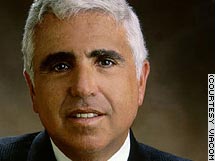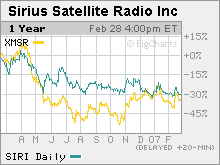Sirius and XM get grilled in CongressSirius CEO Mel Karmazin defends proposed deal in front of a House Judiciary Committee meeting; opponents call merger a "monopoly."NEW YORK (CNNMoney.com) -- Sirius Satellite Radio chief executive officer Mel Karmazin went to Capitol Hill Wednesday to tell Congress why his company's plan to merge with rival XM Satellite Radio should be approved by regulators. Karmazin, in often testy exchanges with several members of Congress, adamantly denied that a merged Sirius-XM would be a monopoly and said that Sirius and XM would agree to certain concessions, including pricing restrictions, in order to ensure that a merger is completed.
Karmazin, along with several consumer advocates and the head of a key trade group representing local radio broadcasters, testified in front of the newly formed Antitrust Task Force of the House Judiciary Committee. "We are absolutely convinced this merger will be in the best interest of consumers," he said. "This merger will give consumers more choice at a lower price and more importantly, less confusion." Sirius (Charts) and XM (Charts) announced last week that they had planned to merge in a $13 billion deal that would unite the nation's only two satellite radio companies. A combined Sirius-XM would have about 14 million subscribers. Sirius is the home of Howard Stern and also has the exclusive satellite radio rights to air National Football League games. XM has shows featuring shock jocks Opie and Anthony, Oprah Winfrey and Bob Dylan and is also the home to Major League Baseball games. Critics have maintained that a merger would be bad for consumers since it would eliminate competition and could potentially lead to higher subscription prices. The two firms currently both charge a monthly fee of $12.95 for their most basic packages. The heads of two consumer advocate groups who testified at the hearing were split as to whether a merger would be good for radio listeners. Gigi Sohn, president and co-founder of Public Knowledge, a Washington D.C.-based advocacy group, said that competition between XM and Sirius has left both companies financially weakened and that a merger could benefit consumers. "I believe consumers will be better off subject to conditions that protect choice, promote diverse programming and keep prices in check," she said, adding that consumers should have the right to choose the types of programming they want in an à la carte fashion. Karmazin said during the hearing that Sirius and XM would agree to pricing restrictions but did not specify for how long. He added that existing subscribers for Sirius and XM would not have to buy new radios to listen to a service from the combined firm. But Mark Cooper, president of the Consumer Federation of America, another consumer advocate group, did not buy Karmazin's contention that a merged Sirius-XM would keep prices steady. "The argument that consumers will be better off with a benevolent monopolist than competition is absurd. Cost savings will not be passed to consumers," he said. "It is competition that is the driver of innovation in this economy, and competition is the best form of protection for consumers." During the hearing, David Rehr, president of the National Association of Broadcasters, a trade group, referred to the possibility of a combined Sirius and XM several times as a "government-sanctioned monopoly." But Karmazin argued that Sirius and XM have to also compete with terrestrial radio stations, Internet radio and mobile digital media devices such as Apple's (Charts) iPod. Judiciary Committee Chairman John Conyers Jr. (D-MI) said, though, that the most critical issue is what kind of precedent the government would be setting if it defined the relevant market for satellite radio as all sources of music entertainment. When the FCC granted the two companies licenses a decade ago, one of the conditions was that there had to be a duopoly and that the two could not merge. So any deal needs to be approved by the Federal Communications Commission as well as by the Justice Department. Charles Biggio, a partner in antitrust and trade regulation with law firm Wilson Sonsini Goodrich and Rosati, testified during the hearing that a merger could be deemed legal, even if it controls 100 percent of the satellite market, as long as there is no anticompetitive effect. But he stressed that it was too soon to judge whether this would be the case. Shares of Sirius and XM, which both reported fourth-quarter results earlier this week, finished the day relatively flat in trading on the Nasdaq Wednesday. Both Sirius and XM reported strong growth in sales as they added more subscribers. But each company has continued to rack up sizable losses because of large startup costs and heavy expenses for programming as well as increased spending on marketing in order to attract new listeners. As such, some industry and legal experts have maintained that Sirius and XM may try and make a failed-company argument, that is, that the only way for either of them to survive is if they merged, in order to get regulatory approval. Karmazin said, however, that he was not making a failed company argument and that would life would go on for Sirius and XM if the government rejected the deal. He added that he did not feel his company overpaid for programming talent such as Howard Stern, even though Rep. Steve Cohen (D-TN) quipped that Stern's compensation package, which included the recent bonus payment of $83 million in Sirius stock, rated as "obscene." |
Sponsors
|


